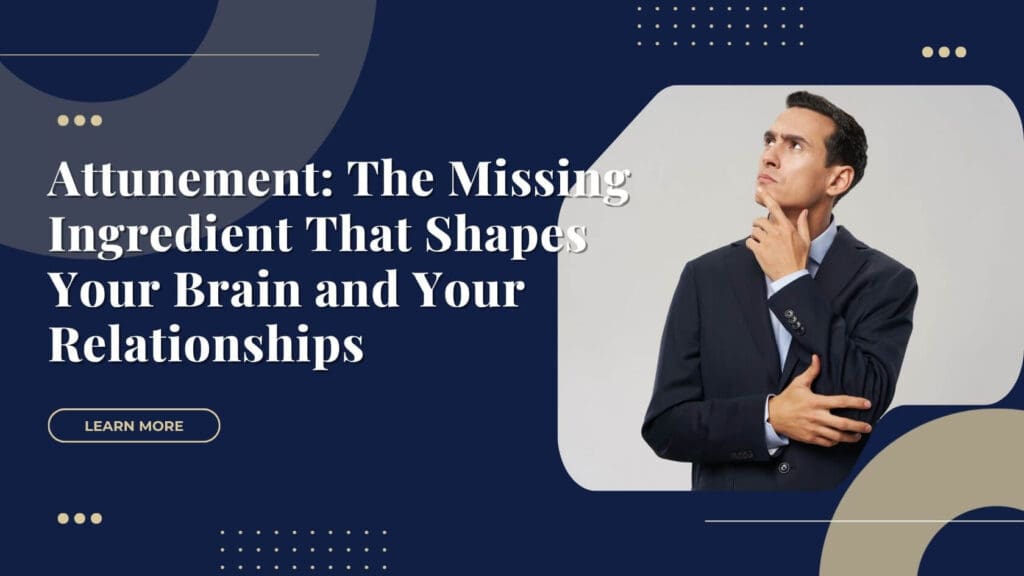Most people believe it’s the arguments that break a relationship. But neuroscience shows us something deeper: the real damage comes from a lack of attunement. When your partner doesn’t notice, doesn’t respond, or doesn’t repair disconnection, your brain encodes this absence of care as danger. Over time, these micro-moments of neglect and dismissal don’t just hurt your feelings—they actually change the way your brain functions.
In my 17 years as a psychologist and leadership coach, I’ve seen how attunement—or the lack of it—not only impacts marriages and partnerships, but also how executives, entrepreneurs, and teams perform. Attunement is not optional. It is neurological oxygen.
What Is Attunement?
Attunement is the ability to be present, responsive, and emotionally connected with another person. It’s when a partner, colleague, or leader notices your signals, validates your needs, and adjusts to support connection.
When attunement is present, our nervous systems regulate together. When it’s missing, our brain and body register isolation and threat.
10 Ways Lack of Attunement Damages the Brain
Attachment Circuits Break Down
Without attunement, oxytocin, the bonding hormone, drops. This erodes the neural pathways responsible for trust and relational safety.
Amygdala Hyperactivation
Emotional neglect is processed like danger. The amygdala stays on high alert, keeping you locked in survival mode.
Cortisol Flooding
Stress hormones stay elevated when there’s no repair or connection. Over time, this shrinks the hippocampus, harming memory and learning.
Weakened Prefrontal Cortex
Disconnection lowers activity in the part of the brain responsible for focus, planning, and emotional regulation.
Self-Doubt Circuitry
When your feelings are missed or dismissed, your brain wires toward self-doubt, weakening confidence and self-trust.
Learned Helplessness
Repeated experiences of disconnection train the brain to stop reaching for support, reducing resilience and motivation.
Nervous System Dysregulation
Without co-regulation from an attuned partner or leader, the vagus nerve remains dysregulated. Calm feels impossible.
Erosion of Empathy Networks
When attunement is absent, mirror neuron activity diminishes. This deepens isolation instead of fostering connection.
Increased Depression Risk
Neglect disrupts dopamine and serotonin pathways, increasing vulnerability to depression and burnout.
Relational Trauma Imprints
The brain encodes repeated dismissal as “normal,” making it harder to trust even in healthier future relationships.
Why This Matters in Business and Leadership
The same principle applies beyond romantic relationships. In the workplace, a lack of attunement from leaders leads to disengagement, high turnover, and team dysfunction. Employees don’t leave companies—they leave managers who fail to see and respond to them.
Attunement is at the core of both personal fulfillment and business performance. Leaders who cultivate attunement create environments where people feel safe, supported, and inspired. That safety translates into innovation, productivity, and loyalty.
The Path to Healing
The good news: your brain is plastic. With practice, support, and intentional repair, it is possible to rewire old patterns. Therapy, coaching, mindfulness, and emotionally intelligent leadership development can restore attunement and help re-establish healthy neural pathways.
Final Thought
Arguments don’t break us. Disconnection does.
Attunement is not just emotional—it’s neurological. It’s what allows us to thrive in relationships, in leadership, and in life. If you’re leading a business, building a relationship, or scaling your own self-mastery, attunement is the skill that determines your capacity for connection and success.
References
McEwen, B. S. (2017). Neurobiological and systemic effects of chronic stress. Dialogues in Clinical Neuroscience, 19(2), 105–111. https://www.ncbi.nlm.nih.gov/pmc/articles/PMC5579396/
Gottman, J., & Gottman, J. (2015). 10 Principles for Doing Effective Couples Therapy. W. W. Norton & Company.
Teicher, M. H., & Samson, J. A. (2016). Enduring neurobiological effects of abuse and neglect. Journal of Child Psychology and Psychiatry, 57(3), 241–266. https://doi.org/10.1111/jcpp.12507
Porges, S. W. (2011). The Polyvagal Theory: Neurophysiological Foundations of Emotions, Attachment, Communication, and Self-Regulation.






